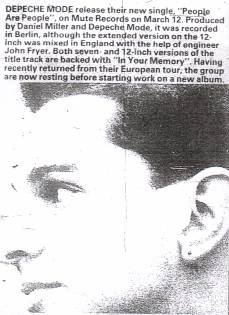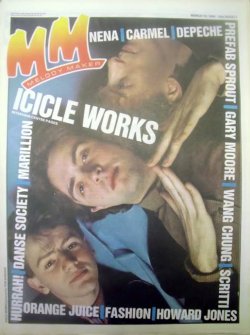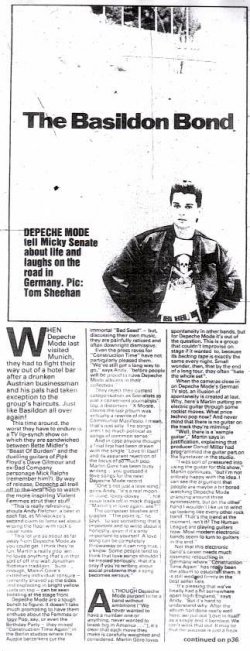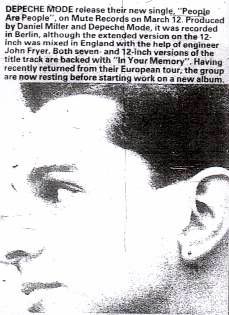The Basildon Bond
[Melody Maker, 10th March 1984. Words: Micky Senate. Picture: Tom Sheehan.]


THE BASILDON BOND
When Depeche Mode last visited Munich, they had to fight their way out of a hotel bar after a drunken Austrian businessman and his pals had taken exception to the group’s haircuts. Just like Basildon all over again!
This time around, the worst they have to endure is a TV lip-synch show on which they are sandwiched between Bette Midler’s “Beast Of Burden” and the duelling guitars of Pink Floyd’s Dave Gilmour and ex-Bad Company personage Mick Ralphs (remember him?). By way of release, Depeche all troll off to the local hop to watch the more inspiring Violent Femmes strut their stuff.
“This is really refreshing,” shouts Andy Fletcher, a beer in each fist, as Milwaukee’s second claim to fame set about wiping the floor with rock’s usual rules.
“This lot are about as far away from Depeche as you could get. I think they’re fun. Martin’s really into ‘em… he loves anything that’s in that sort of off-the-wall Jonathan Richman tradition.” Sure enough, Martin Gore’s extremely individual tonsure – currently shaved up the sides and exploding in bright yellow curls on top – can be seen bobbing at the stage front.
Depeche Mode are a tough bunch to figure. It doesn’t take much prompting to have them enthuse about the Femmes or Iggy Pop, say, or even the Birthday Party – they mixed “Construction Time Again” in the Berlin studios where the Aussie berzerkers cut the immortal “Bad Seed” – but, discussing their own music, they are painfully reticent and often downright dismissive.
Even the press raves for “Construction Time” have not particularly pleased them. “We’ve still got a long way to go,” says Andy, “before people will be proud to have Depeche Mode albums in their collection.”
They reject their current categorisation as Socialists as just a convenient journalists’ tag, a distortion. “X Moore claims the last album was virtually a rewrite of the Communist Manifesto. I mean, that’s just silly. The songs aren’t so much political as songs of common sense.” [1]
And in case anyone thought a final line had been drawn with the single “Love In Itself” and its apparent rejection of the focus of so much pop, Martin Gore has been busy writing – you guessed it – love songs for the next Depeche Mode record.
“One’s not just a love song,” grins Andy, “it’s a real moon-in-June, lovey-dovey…”, his voice trails off in mock disgust. “Martin’s in love again, see?”
The composer blushes and giggles. “The point is,” he says, “to see something that’s important and to write about it honestly, even if it’s only important to yourself. A love song can be completely throwaway or it can ring true, y’know. Some people tend to think that love songs shouldn’t be treated seriously, that it’s only if you’re writing about social problems that a song becomes serious.”
Although Depeche Mode purport to be a band without ambitions (“We never wanted to have a number one or anything, never wanted to break big in America…”), it’s clear that each move they make is carefully weighed and considered. Martin Gore loves spontaneity in other bands, but for Depeche Mode it’s out of the question. This is a group that couldn’t improvise on stage if it wanted to, because its backing tape is exactly the same every night. Small wonder, then, that by the end of a long tour, they often “hate the whole set”.
When the cameras close in on Depeche Mode’s German TV slot, an illusion of spontaneity is created at last. Why, here’s Martin putting an electric guitar through some rockist moves. What price techno pop now? And never mind that there is no guitar on the track they’re miming!
“Well, there is a ‘sample guitar’,” Martin says in justification, explaining that producer Daniel Miller had programmed the guitar part on the Synclavier in the studio.
“I was sort of pressured into using the guitar for this show,” Martin continues, “but I’m not entirely happy with the idea. I can see the argument that people are maybe a bit bored watching Depeche Mode prancing around three synthesizers, but on the other hand I wouldn’t like us to wind up looking like every other rock band. That’s the trend at the moment, isn’t it? The Human League are playing guitars now. Most modern electronic bands seem to turn to guitars in the end.”
Not that this electronic band’s career needs much cosmetic retouching in Germany where “Construction Time Again” has really been the album to establish them. It is still wedged firmly in the best seller lists.
“It’s pleasing that we’ve finally had a hit somewhere apart from England,” says Andy. “But it’s hard to understand why. After the album had done really well here, we put out ‘Love In Itself’ as a single and it bombed. We can’t work that out. It may be that the success is just a freak thing; maybe it’ll never happen again.”
Martin: “When Daniel first read the lyrics of the album, he said, ‘Oh yeah, this’ll go down all right with the Green Party.’ Can’t imagine it myself. If they’ve been buying the record, they certainly haven’t been at the concerts…”
A suggestion that Depeche remove themselves to the European Continent on a permanent basis to capitalise on their new popularity is waves away…
“No, it’s true that Basildon is not the centre of the world, but when you’ve lived there all your life, it’s hard to make the move. All our friends are there. Vince Clarke, right, he moved to Walton-on-Thames, and even that was too far away. He’s thinking of coming back to Basildon.”
Tours, viewed as a mixed blessing – “a good time is had by all, apart from us” – do at least have the function of getting the band out of Essex. Depeche Mode are currently en route for Spain and Italy. They’ll be back in May to record the follow-up album to “Construction Time” which should, all things being equal, be out in September. In October, they’ll tour Britain and in November revisit Germany. After which they’ll probably have another stab at the States.
“And no doubt,” says Martin, smiling, “we’ll repeat the entire schedule in 1985”.
Andy grimaces. “It’s not always as boring as it sounds.”
[News item - author and photographer uncredited]
Depeche Mode release their new single, “People Are People”, on Mute Records on March 12. Produced by Daniel Miller and Depeche Mode, it was recorded in Berlin, although the extended version on the 12-inch was mixed in England with the help of engineer John Fryer. Both seven- and 12-inch versions of the title track are backed with “In Your Memory”. Having recently returned from their European tour, the group are now resting before starting work on a new album.
[Melody Maker, 10th March 1984. Words: Micky Senate. Picture: Tom Sheehan.]
Despite having a title that every journalist thinks they're the first to discover, this is a very worthwhile article where the writer has taken care to look for the human beings behind Depeche Mode rather than just follow the usual avenues. It looks into the musical developments they were making, especially in lyrics, and makes a concerted effort to show the band as much more than the usual stereotypes. Includes a brief news item.
“We’ve still got a long way to go,” says Andy, “before people will be proud to have Depeche Mode albums in their collection.”


THE BASILDON BOND
When Depeche Mode last visited Munich, they had to fight their way out of a hotel bar after a drunken Austrian businessman and his pals had taken exception to the group’s haircuts. Just like Basildon all over again!
This time around, the worst they have to endure is a TV lip-synch show on which they are sandwiched between Bette Midler’s “Beast Of Burden” and the duelling guitars of Pink Floyd’s Dave Gilmour and ex-Bad Company personage Mick Ralphs (remember him?). By way of release, Depeche all troll off to the local hop to watch the more inspiring Violent Femmes strut their stuff.
“This is really refreshing,” shouts Andy Fletcher, a beer in each fist, as Milwaukee’s second claim to fame set about wiping the floor with rock’s usual rules.
“This lot are about as far away from Depeche as you could get. I think they’re fun. Martin’s really into ‘em… he loves anything that’s in that sort of off-the-wall Jonathan Richman tradition.” Sure enough, Martin Gore’s extremely individual tonsure – currently shaved up the sides and exploding in bright yellow curls on top – can be seen bobbing at the stage front.
Depeche Mode are a tough bunch to figure. It doesn’t take much prompting to have them enthuse about the Femmes or Iggy Pop, say, or even the Birthday Party – they mixed “Construction Time Again” in the Berlin studios where the Aussie berzerkers cut the immortal “Bad Seed” – but, discussing their own music, they are painfully reticent and often downright dismissive.
Even the press raves for “Construction Time” have not particularly pleased them. “We’ve still got a long way to go,” says Andy, “before people will be proud to have Depeche Mode albums in their collection.”
They reject their current categorisation as Socialists as just a convenient journalists’ tag, a distortion. “X Moore claims the last album was virtually a rewrite of the Communist Manifesto. I mean, that’s just silly. The songs aren’t so much political as songs of common sense.” [1]
And in case anyone thought a final line had been drawn with the single “Love In Itself” and its apparent rejection of the focus of so much pop, Martin Gore has been busy writing – you guessed it – love songs for the next Depeche Mode record.
“One’s not just a love song,” grins Andy, “it’s a real moon-in-June, lovey-dovey…”, his voice trails off in mock disgust. “Martin’s in love again, see?”
The composer blushes and giggles. “The point is,” he says, “to see something that’s important and to write about it honestly, even if it’s only important to yourself. A love song can be completely throwaway or it can ring true, y’know. Some people tend to think that love songs shouldn’t be treated seriously, that it’s only if you’re writing about social problems that a song becomes serious.”
Although Depeche Mode purport to be a band without ambitions (“We never wanted to have a number one or anything, never wanted to break big in America…”), it’s clear that each move they make is carefully weighed and considered. Martin Gore loves spontaneity in other bands, but for Depeche Mode it’s out of the question. This is a group that couldn’t improvise on stage if it wanted to, because its backing tape is exactly the same every night. Small wonder, then, that by the end of a long tour, they often “hate the whole set”.
When the cameras close in on Depeche Mode’s German TV slot, an illusion of spontaneity is created at last. Why, here’s Martin putting an electric guitar through some rockist moves. What price techno pop now? And never mind that there is no guitar on the track they’re miming!
“Well, there is a ‘sample guitar’,” Martin says in justification, explaining that producer Daniel Miller had programmed the guitar part on the Synclavier in the studio.
“I was sort of pressured into using the guitar for this show,” Martin continues, “but I’m not entirely happy with the idea. I can see the argument that people are maybe a bit bored watching Depeche Mode prancing around three synthesizers, but on the other hand I wouldn’t like us to wind up looking like every other rock band. That’s the trend at the moment, isn’t it? The Human League are playing guitars now. Most modern electronic bands seem to turn to guitars in the end.”
Not that this electronic band’s career needs much cosmetic retouching in Germany where “Construction Time Again” has really been the album to establish them. It is still wedged firmly in the best seller lists.
“It’s pleasing that we’ve finally had a hit somewhere apart from England,” says Andy. “But it’s hard to understand why. After the album had done really well here, we put out ‘Love In Itself’ as a single and it bombed. We can’t work that out. It may be that the success is just a freak thing; maybe it’ll never happen again.”
Martin: “When Daniel first read the lyrics of the album, he said, ‘Oh yeah, this’ll go down all right with the Green Party.’ Can’t imagine it myself. If they’ve been buying the record, they certainly haven’t been at the concerts…”
A suggestion that Depeche remove themselves to the European Continent on a permanent basis to capitalise on their new popularity is waves away…
“No, it’s true that Basildon is not the centre of the world, but when you’ve lived there all your life, it’s hard to make the move. All our friends are there. Vince Clarke, right, he moved to Walton-on-Thames, and even that was too far away. He’s thinking of coming back to Basildon.”
Tours, viewed as a mixed blessing – “a good time is had by all, apart from us” – do at least have the function of getting the band out of Essex. Depeche Mode are currently en route for Spain and Italy. They’ll be back in May to record the follow-up album to “Construction Time” which should, all things being equal, be out in September. In October, they’ll tour Britain and in November revisit Germany. After which they’ll probably have another stab at the States.
“And no doubt,” says Martin, smiling, “we’ll repeat the entire schedule in 1985”.
Andy grimaces. “It’s not always as boring as it sounds.”
[News item - author and photographer uncredited]

Depeche Mode release their new single, “People Are People”, on Mute Records on March 12. Produced by Daniel Miller and Depeche Mode, it was recorded in Berlin, although the extended version on the 12-inch was mixed in England with the help of engineer John Fryer. Both seven- and 12-inch versions of the title track are backed with “In Your Memory”. Having recently returned from their European tour, the group are now resting before starting work on a new album.
[1] - Read this article which (for better or worse) was the lynchpin in Depeche Mode getting briefly typed as left-wing in 1983-84.
Last edited:




